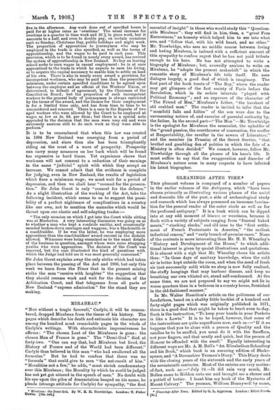MIRABEAU.*
" NOT without a tragic farewell," Carlyle, it will be remem- bered, dropped Mirabeau from the tissue of his history. The pages which describe his death and estimate his character are among the hundred most remarkable pages in the whole of Carlyle's writings. With characteristic impressiveness he affirms : " The chosen Last of the Mirabeaus is gone : the chosen Man of France is gone." The "Demi-G-od " died at forty-two. " One can say that, had Mirabeau but lived, the History of France and of the World had been different." Carlyle thus believed in this man " who had swallowed all the formulas." But he had to confess that there was no "formula" that could give to men "the net-result of him." "Moralities not a few," he adds, "must shriek condemnatory over this Mirabeau; the Morality by which he could be judged has not yet got uttered in the speech of men." No doubt with his eye upon the piles of denunciation heaped on his name, he pleads (strange attitude for Carlyle) for sympathy, "the first
*
Mirabeau: the Demi-Gocl. By W. B. Ef. Trowbridge. London: T. Fisher Unwin. [15s, net.] essential of insight" in those who would study this " Question- able Mirabeau": they will find in him,-then, a "great Free Earnestness," an honesty which helped him to see into what was, and "follow that, with his wild heart, and no other." Mr. Trowbridge, who sees no middle course between loving and hating Mirabeau, is imbued with a sufficient amount of this sympathy to confess regret that he has not paid tribute enough to his hero. He has not attempted to write a biography of Mirabeau ; but, avowedly anxious to write on Mirabeau, he "adopts the present makeshift" in which the romantio story of Mirabeau's life tells itself. He uses dialogue largely, a good deal of which is imaginary. The first part of the book treats of "The Boy," where the reader may get glimpses of the fast society of Paris before the Revolution, which in its sedate intervals "played with Political Economy " ; and an exposure of the character of "The Friend of Men," Mirabeau's father, "the harshest of old crabbed men." The reader is invited to infer that the "manifold falls and follies" of the son were due to the unreasoning nature of, and exercise of parental authority by, the father. In the second part—" The Man "—Mr. Trowbridge is the apologist for Mirabeau the sensualist, the upholder of the "grand passion, the overthrower of convention, the scoffer at Respectability, the reveller in the sewers of Literature," and the member (in Prussia) of the Secret Service, " that brothel and gambling den of politics in which the fate of a Ministry is often decided." We cannot, however, follow Mr. Trowbridge through all the phases of his hero's life. It must suffice to say that the exaggeration and disorder of Mirabeau's nature seem in many respects to have infected his latest biographer.














































 Previous page
Previous page